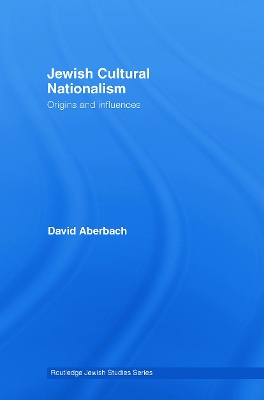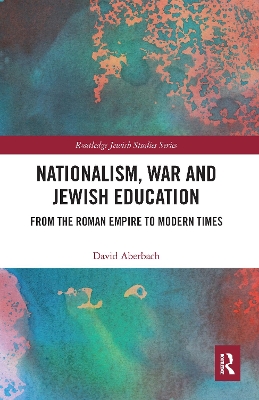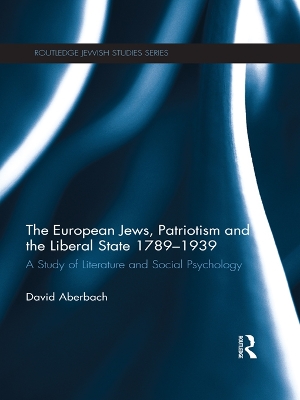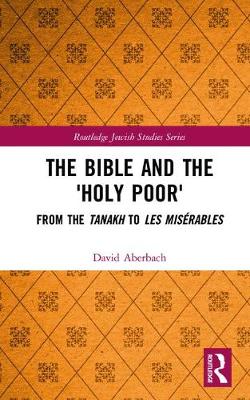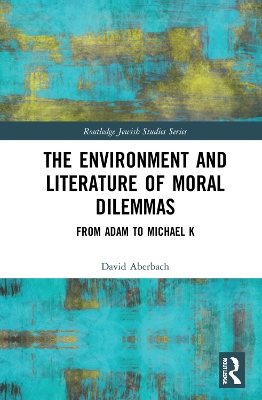Routledge Jewish Studies
5 total works
Jewish Cultural Nationalism explores the development of Jewish nationalism from the Bible to modern times, focusing on particular movements and places as well as texts which signified, or themselves brought about, change: the Bible (Hebrew prayer book), and the modern Hebrew literature, particularly in Tsarist Russia. While the influence of the Hebrew Bible alone on nationalism in individual periods has been subject to much scholarly study, the present work is unusual in its emphasis on the continuity of Jewish cultural nationalism and its influences through Hebrew texts.
Nationalism, War and Jewish Education explores historical circumstances leading to the emergence of a Jewish religious school system lasting to modern times and the process by which this system was broken down and adapted in secular form as Jewish nationalism grew in the 19th and early 20th centuries. In the Roman period, education became an essential part of rabbinic pacifist accommodation following Jewish defeats, while in the modern period, secular education was associated with nationalism and increasing militancy of emerging states. In both periods there was a revival of Hebrew and the creation of an educational system based on Hebrew texts. Both revivals were responses to anti-Semitism, which pushed large numbers of Jews away from assimilation into the dominant culture to a renewed Jewish national identity.
The book highlights the centrifugal and centripetal shifts in Jewish identity, from messianic militarism to pacifism and back. It shows how changes in Jewish education accompanied these shifts. While drawing on historical scholarship for background, this book is essentially a literary study, showing how literary changes at different times and places reflect historical, socio-psychological, economic and political change.
Nationalism, War and Jewish Education is original in showing how ancient Jewish education affected modern Jewish society, therefore it is a valuable resource for students and researchers interested in Jewish history and literature, education, development studies and nationalism.
The European Jews, Patriotism and the Liberal State 1789-1939
by David Aberbach
The fragility of the liberal democratic state after 1789 is illustrated in the history of the European Jews from the French Revolution to the Holocaust. Emancipation and hope of emancipation amongst the European Jewish population created a plethora of Jewish identities and forms of patriotism.
This book takes the original approach of studying European Jewish patriotism as a whole, with particular attention given to creative literature. Despite their growing awareness of racial, genocidal hatred, most European Jews between 1789 and 1939 tended to be patriotic toward the countries of their citizenship, an attitude reflected in the literature of the time.
Yet, the common assumption among emancipated Jews that anti-Semitism would fade in a world governed by reason proved false. For millions of European Jews, the infinite possibilities they associated with emancipation came to nothing. The Jewish experience exposed many of the weaknesses and failings of the liberal multicultural state, and demonstrated that its survival cannot be taken for granted but is dependent on vigilance and struggle. By focusing on Jewish patriotism from 1789-1939, this book explores the nature of the liberal state, how it can fail, and the conditions needed for its survival.
The Hebrew Bible is the main legislative and literary influence on European Poor Law and on literature on poverty and the poor. No extant literature from the ancient world placed more importance upon social welfare and the duty of the better-off toward the poor. It is the founding text for liberation movements.
This book assesses why the Bible is so unambiguously positive in its view of the poor, unlike most later literary and legislative works. It seeks to understand what historical circumstances brought about this elevated perception of the poor, by exploring the clash of ideals and realities in the depiction of the poor in the Hebrew Bible and in European culture. Most legal and literary portrayals of the poor tend to be critical, associating the poor with laziness, crime or fraud: why is this not the case in the Bible? Most societies have tended to accept poverty as a natural condition, but not the Bible. The idea of ending poverty starts in the Bible - the Psalms above all inspired a daily struggle to limit the gap between rich and poor. Much of the Bible sees life - most unusually in the history of civilizations - through the eyes of the poor. The book argues that the popular appeal of the Bible in largely impoverished societies lies in its persistent relevance to, and support of, the poor. Yet, in many ways, biblical teachings were incompatible with social and political circumstances centuries and millennia later.
Written in a clear, accessible style, the book shows how the Hebrew Bible, in its legislation and impassioned prophetic poetry, inspired the battle to 'make poverty history', to give dignity and hope to the poor and fight inequality. It will appeal to students and scholars of Jewish Studies, the Bible and Comparative Literature, and Development Studies.
Exploring the literature of environmental moral dilemmas from the Hebrew Bible to modern times, this book argues the necessity of cross-disciplinary approaches to environmental studies, as a subject affecting everyone, in every aspect of life.
Moral dilemmas are central in the literary genre of protest against the effects of industry, particularly in Romantic literature and 'Condition of England' novels. Writers from the time of the Industrial Revolution to the present-including William Blake, Elizabeth Gaskell, Charles Dickens, Emile Zola, Henrik Ibsen, Anton Chekhov, T.S. Eliot, John Steinbeck, George Orwell, and J.M. Coetzee-follow the Bible in seeing environmental problems in moral terms, as a consequence of human agency. The issues raised by these and other writers-including damage to the environment and its effects on health and quality of life, particularly on the poor; economic conflicts of interest; water and air pollution, deforestation, and the environmental effects of war-are fundamentally the same today, making their works a continual source of interest and insight.
Sketching a brief literary history on the impact of human behavior on the environment, this volume will be of interest to readers researching environmental studies, literary studies, religious studies and international development, as well as a useful resource to scientists and readers of the Arts.
